- Home
- Alton Gansky
Wounds Page 2
Wounds Read online
Page 2
The work might be suspended for the students, but it had just begun for the professors. Most would take a few days off, but midterm exams fell this week and eager ministry students would be pestering the faculty for grades.
That suited Ellis just fine. He held no great love for grading term papers. Most were badly written, rushed, and poorly researched, but occasionally a student showed extraordinary promise. That’s what he lived for. Professors loved to intellectually clone themselves, and he was no different.
The drip coffeemaker sputtered like a dying car engine, signaling its work had ended. Ellis rose and poured the Ethiopian blend into a mug. The cup had been a gift from a fellow professor. In a creative flare, someone had researched the insults that appear in Shakespeare’s writings and printed them on the cup’s surface. “I wish we could be better strangers,” and “You flop-eared, beetle-headed knave” were his favorites. He had no idea why.
Returning to his desk, he settled in again, hearing the familiar squeak of his chair. Pulling the first essay from the stack, he opened the folder and smiled to see a neatly typed presentation complete with the proper title sheet and the correct number of pages. It always puzzled him that graduate-level students couldn’t follow simple instructions. This one had.
“Potuit Non Peccare; Non Potuit Peccare” the title read. The student was showing off his Latin and his research. Ellis liked that. Not a bad topic for a survey of systematic theology course. “Able not to sin; not able to sin,” the student wrote, “the debate has lasted centuries. The impeccability of Christ (His ability or inability to sin) has troubled theological minds—”
A knock on the door pulled Ellis from his reading. He heard the knob turn and watched the door slowly open.
“Dr. Poe?”
Dr. Allen Dunne, academic dean for the school, slipped in. Ellis liked Dunne. He had moved from the pulpit to the lectern almost a decade ago. In that time, he had gone from adjunct professor to dean.
“Come in, Dr. Dunne.”
Allen crossed the threshold, stepped to the desk, and sat in the “student’s” chair.
Ellis offered Allen coffee but he declined. It took a few moments for Ellis to realize that something troubled his colleague. Normally gregarious and quick to laugh, Allen looked drawn and thin, like a man at the end of a protracted illness.
Allen pursed his lips. “Back in my pastor days, I learned the best way to deliver bad news is quickly, then deal with the emotions next.”
“There’s bad news?” Ellis’s stomach soured.
“Doug Lindsey is dead. The police found his body early this morning in Balboa Park.”
“No.” Something twisted inside Ellis. “Accident?”
Allen shook his head. “Murder. The police are sure of it. I’m talking to whoever is on campus. I’ll call the other faculty when I’m done.”
“Murder? How? When?” Ellis’s blood pooled in his feet. “I’m sorry. Apparently I’m incoherent.”
“Understandable. It took me ten minutes to get out of my chair.”
“I don’t know what to say.”
“Words fail at times like this.” Allen paused. “You knew him well?”
Ellis nodded. “As well as a professor can know a student. Bright, clever, insightful, humorous. A class leader.”
“M.Div. student, right?”
“Yes.” Master of Divinity, one of the longer degree programs at the seminary—three years for the full-time student. “He planned to enter pulpit ministry, although I overheard him talking to another student about missionary work. I think he was still trying to find his role in the world.”
“Most of us go through that, Ellis. I know I did.”
“What can I do?”
“When I’m done talking to the on-campus faculty and making my calls, I’m going to pick up Loren and swing by the family’s home. You’re welcome to come along.”
Ellis feared Allen would say that. “I’m not very good at that kind of thing. I-I’m sorry.”
“No problem. The police are going to come by. It would help to have someone show them around and answer their questions.”
“I’ll stay here until they arrive.”
Allen stood and Ellis joined him. “If you need me, Ellis, don’t hesitate to call.”
“I won’t. I’ll keep you in prayer.”
Allen thanked him and left. Ellis returned to the window and looked on the panorama again. A few moments ago he saw beauty; now all he could see was a planet infested with evil—the same kind of evil that kept him withdrawn from others.
The same kind of evil that kept him frightened all the time.
3
Carmen Rainmondi pulled the black Crown Victoria up the grade onto the campus of San Diego Theological Seminary and tried to get her bearings. Several large, uninspired rectangular buildings with red-tile roofs formed a cluster around a broad concrete courtyard. A fountain bubbled in the center and concrete benches provided seating areas.
The parking lot and driveway extended around the buildings and a large open field of freshly mowed grass. She saw no chalk stripes indicating the lawn area was part of a sports field. Did seminaries have team sports? She guessed not.
“Nice place,” Bud Tock said. “Clean, nicely landscaped. Yup, a man could do some real study in a place like this.”
Carmen cut her eyes his way. “When did you last crack a book?”
“You wound me, Carmen. I began a new book just last night.”
“Did it come with crayons?” She smiled.
“I’m not talking a coloring book here. I mean a real live book. It’s a novel.”
“Who wrote it?” She parked as close to the courtyard as she could. There were very few vehicles, which struck her as odd.
“I don’t remember.” Tock opened his door. Carmen did the same with hers and they exited. The air had warmed as the day grew older.
“Yep, you’re a scholar all right.”
“Oh, really? And what was the last book you read?”
Carmen struggled to look nonchalant. “I reread a Jane Austen novel and followed that with the latest Dean Koontz. I read all his stuff. Before those—”
“All right, all right, I get the picture. Can I help it if I prefer movies and television?”
They walked from the lot and through the center of the courtyard. Large, bronze, block letters marked the buildings. Carmen headed for the one marked “Administration.”
A pair of tinted glass doors opened to a lobby of green carpet, white plaster walls, a counter, and half-wall that separated the visitor’s area from the offices. Several desks were visible beyond the counter. Carmen could see a hallway a few feet farther on.
A young woman seated at the closest desk rose and approached. “May I help you?”
Carmen judged her to be in her mid-twenties, fawn hair, clear blue eyes, and perfect skin. For a moment, Carmen wished she were twenty-five again.
“Good morning, I’m Detective Carmen Rainmondi and this is my partner Bud Tock. I called and spoke to Mr. Allen Dunne. He said there would be someone here to help us.”
“Dr. Dunne is visiting Doug’s family, but he told me that I should direct you to Dr. Poe.”
“Poe? As in Edgar Allen?” Bud grinned.
“Yes. Dr. Poe is the head of New Testament studies. I’ll let him know you’re here.” She began to turn.
“Before you do, maybe you could help us.” Carmen beamed her friendliest smile at the young woman.
“If I can.”
“May I ask your name?” Carmen spoke as Bud removed a small notepad from his suit coat. They often worked this way: one asked questions, the other took notes, only talking if something important was overlooked.
“Missy Robinson.”
“And you’re the re
ceptionist?”
“Just part-time when school is in session. It helps pay the tuition. Since it’s Easter break, I’m putting in eight hours a day.”
“So you’re a student?” That surprised Carmen.
Missy picked up on it. “About a third of the students are female.”
“But don’t people go to seminary to become priests?”
Missy grinned. “This is an evangelical seminary. Some of the students will become pastors, some will go to the mission field, others will teach.”
“Which are you?” Carmen let the curt question hide her embarrassment.
“I’m in the academic track. My undergraduate degree is in archaeology. I want to do field research in biblical archaeology for a decade or so, then gain tenure as a professor somewhere.”
Carmen swallowed. She was so out of her element. Time to bring things back to center. “I assume Mr. Dunne . . . Dr. Dunne told you why we’re here.”
The receptionist’s expression drooped, as if sadness had just tripled gravity’s pull on her face. “He did.”
“Did you know Doug Lindsey?”
Her head moved from side to side. “Not really. He is a third-year M.Div. student.”
Carmen frowned. “Emdiv?”
“Master of Divinity,” Missy explained. “It’s a three-year degree track. It’s the program you enter if you want to be the pastor of a church or a missionary.”
“That’s different from what you’re doing?” Carmen tilted her head to the side.
“Again, I’m in an academic track. Let me try it this way: You go to the doctor because you’re sick. He examines you and gives you a medication to take. The doctor has a doctor of medicine degree: an MD. The people who did the research and designed the medication you take probably have PhDs. Their education is different from the doctor’s. Things overlap of course, but the MD is a professional degree. The doctor learns a lot of science, but he or she also learns examination techniques, ethics, and things that will help the doctor serve the patient.
“The PhD,” she continued, “may have a degree in chemistry, pharmacology, biology, or something similar. Their education is geared to pure science, while the doctor’s is aimed at creating a professional health-care provider.”
“So the M.Div. student learns, what? Preacher stuff?”
“Theology, Bible, preaching, counseling, administration, and the like. That’s why it takes three years to get the degree. A full-time student can earn an MA in theology or biblical studies in about two years, counting the time it takes to write the thesis. At least, that’s how it’s done here.”
“So you didn’t share many classes with Mr. Lindsey?”
“No.”
“What about socially?”
She shook her head. “Sorry.” She paused. “Shall I call Dr. Poe now?”
Carmen gave a quick look to Bud. “Questions?”
He shook his head. “No questions for her.”
She nodded to Missy. “Then yes, give him a call.”
Ellis Poe squirmed in his seat. Having two detectives in his office made him uneasy. He tried to think of the last time someone other than students or faculty had invaded his space. Well, he knew of one reason for being ill at ease—a reason he didn’t want to talk about.
“You keep it dark in here.”
Ellis watched Detective Rainmondi smile with the comment. He stared at the woman, his heart flopping in his chest like a dying fish. His skin turned cold and clammy. His mind accepted the fact, but his heart refused to believe it.
“Was it something I said?” Carmen’s words chilled the air.
“What? Um, no. I’m sorry. I just lost myself in thought. What did you say?”
“I said you keep it dark in here.”
“I seldom use the overhead lights. I can turn them on if you like. It’s just easier to focus on my work when the lights are dim. I’m weird that way.”
“We’re all a little weird in some way, Dr. Poe.” The woman detective sat in the same chair Allen had used a few hours before. She seemed comfortable and in charge. Ellis wriggled in his seat and felt like a paper wrapper in the wind.
“I can’t tell you how horrible I feel about all this.” Ellis cleared his throat. “Over the years I’ve lost students to auto accidents and one to illness, but never murder. You’re certain it’s murder?”
“We’re proceeding under that assumption.” She paused and studied him. Ellis could almost feel her gaze crawling over his face. “I expected to see Dr. Dunne, but the receptionist said he went to visit Doug Lindsey’s family.”
“Yes, that’s right. Can I offer you some coffee?”
The detective introduced as Bud Tock looked ready to say yes, but the woman waved him off. “No thanks. We were just at the Lindsey home and didn’t see him.”
“I’m not surprised. He told me he was going to pick up Loren first.”
“Loren?”
“His wife. She’s a doctor. It would take him some time to drive to the hospital in San Diego, pick her up, then drive to east county. Doug lived in La Mesa. But I guess you know that since you were just there.”
“We know. Dr. Poe, do you know of anyone who would like to see Doug dead?”
The bluntness of the question made his heart stutter. “No. Doug was a good student and seemed well-liked.”
“Had he ever been in a confrontation on campus?”
“No. Of course not. As I said, he was a fine student. Not top of his class or prone to higher academics, but a good student in his own right.”
“Do you know if he used drugs or alcohol?”
“I suppose it’s possible but not likely. I’d be very surprised if he involved himself in any of that. He studied to be a pastor.”
“Pastors are human too.”
“I won’t argue with that, but I stand by my statement.”
The woman detective nodded but looked unconvinced. “What about his sexual orientation?”
“That’s enough!” Ellis couldn’t help snapping at her. “Now you’re being ridiculous.”
“Why?”
“I imagine you deal with all sorts of unpleasantness in your job, Detective, but that doesn’t mean that every victim of a crime has a substance abuse problem or is involved in some sexual misadventures.”
“Misadventures?” A sardonic grin crossed her face. “I haven’t heard that word in a long time.”
“Doug did nothing or said nothing that would make me think that he was anything other than a sincere Christian looking to serve the church.”
“There’s no need to get defensive, Dr. Poe.” Carmen’s face grew stern, and it made Ellis shift in his chair. “You’re right. We see a lot of unpleasantness—stuff that still curls my hair, which isn’t easy to do. We have to ask these questions. It’s part of the investigation.”
“Still, you go too far.”
“I haven’t gone far enough. Your problem is that you confuse a question with an accusation. Knowing what young Mr. Lindsey wasn’t involved in may be as important as what he was.”
The chastisement landed like a velvet punch. “I’m sorry. I’m probably overreacting.”
“No problem. It’s good to see people stand up for one another. Now, I need to ask a few more questions.”
Ellis nodded.
“When did you last see Mr. Lindsey?” The detective leaned back in the chair.
“Tuesday. Monday and Tuesday were exam days. The students have the rest of this week and all of next week off.”
“Spring break?”
“We still call it ‘Easter break.’ Secular schools have migrated away from the religious titles. We’re not so inclined.”
“Of course. So you spoke to him two days ago?”
“I didn’t rea
lly speak to him. He handed in a paper and wished me a happy Easter. That was it.”
“Did he seem troubled? Worried?”
Ellis let his mind drift back in time. “No. I didn’t sense anything unusual in his behavior.”
“So he was a good student?”
“Better than most. As I said, higher academics weren’t his forte, but his study skills were good and he was dedicated to doing well.”
“And he wanted to be a minister?”
That they were using the past tense gnawed at Ellis. Every past participle stung. The detectives stared at him, waiting for his answer. They gave no sign of being disturbed. Another body, another murder—a routine day for them.
“Dr. Poe?”
Ellis forced himself back into the moment. “Yes. Students declare their intent when they enter the seminary. That information is shared with the professors. It helps us understand our students. Doug wanted to enter the pastorate.”
“And his behavior was consistent with that goal?”
“As far as I could tell, yes. Look, Detective, if you’re hoping that I can tell you I had concerns about him, or that he was a troublemaker, then you’re going to be disappointed. Doug came to campus, did his work, seemed comfortable with the other students, and did nothing to raise a flag with me.”
“So no disciplinary actions were ever taken?”
“None that I know of.”
“Would you know if there had been?” Her expression never changed and it unnerved Ellis.
“If it were serious, I would have known. Word would have reached me from the administration or other professors.”
“You shared information on your students?”
“Only if it might affect other instructors or their classes.” Carmen Rainmondi looked disappointed. “I know it would make your life a lot easier if Doug had a history of trouble, but he doesn’t. At least as far as I know. I wish I could be more helpful.”
The woman stood. “We appreciate your time.” She handed him a business card. “That’s my office number and my cell number. If you think of anything that might help us in our investigation, then call.”
Ellis said he would, then stood. The two detectives left, and Ellis returned to his desk chair and wondered who would want to kill a seminary student. Then his mind went where he knew it must . . .

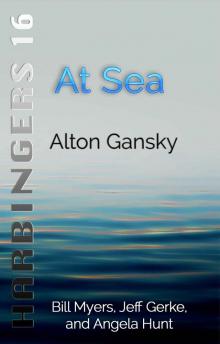 At Sea (Harbingers Book 16)
At Sea (Harbingers Book 16)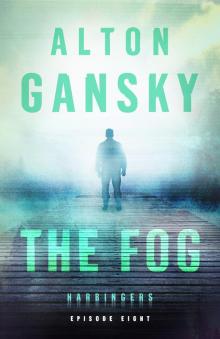 The Fog
The Fog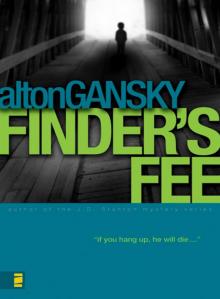 Finder's Fee
Finder's Fee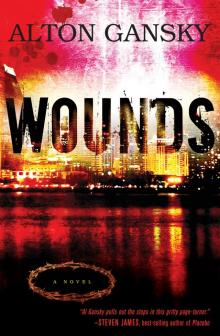 Wounds
Wounds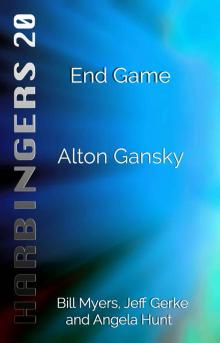 End Game (Harbingers Book 20)
End Game (Harbingers Book 20)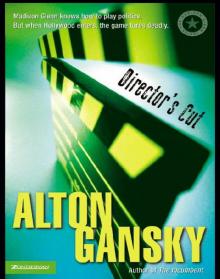 Director's Cut
Director's Cut Zero-G
Zero-G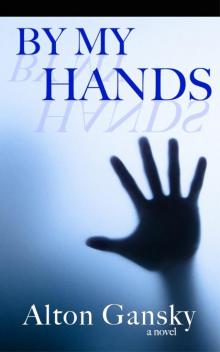 By My Hands
By My Hands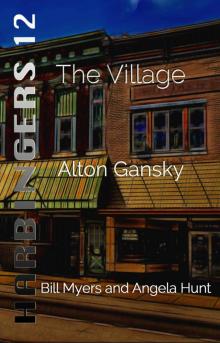 The Village (Harbingers Book 12)
The Village (Harbingers Book 12) Beneath the Ice
Beneath the Ice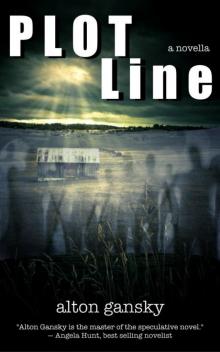 Plot Line
Plot Line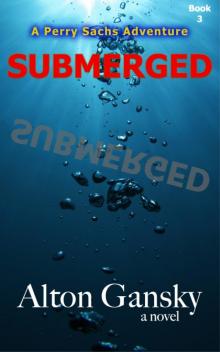 Submerged
Submerged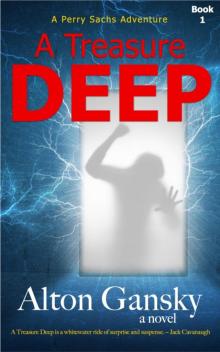 A Treasure Deep
A Treasure Deep